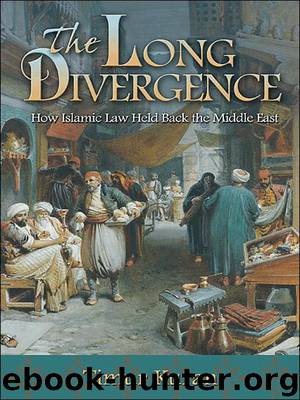The Long Divergence by Timur Kuran

Author:Timur Kuran
Language: eng
Format: epub
Publisher: Princeton University Press
Published: 2011-05-13T04:00:00+00:00
The Onset of Reverse Discrimination
By no means were western negotiators interested only in the predictability of their investments. As their bargaining power rose, they also pursued outright privileges. Already in the early seventeenth century European consuls in Istanbul were exempt from taxation, as were their dragomans.46 In time the capitulations provided foreign merchants immunity from new taxes. In fact, it became the norm to forbid charges on foreigners unless allowed specifically by a treaty. Of the seventy-five articles that comprise the English capitulations of 1675, no fewer than twenty-eight limit a charge.47
In subsequent years western negotiators sought exemptions from paying for services. Ultimately they were so successful that capitulary tax restrictions were interpreted as giving foreigners and their protégés free access to services for which most natives were charged. In the late nineteenth century, for example, western governments invoked the capitulations to exempt their nationals from a municipal fee to finance storage tanks for flammable liquids.48 Foreigners thereby escaped a charge that European municipalities imposed freely on their constituents. Eventually, western fiscal privileges reached the point where an Ottoman subject could avoid a tax, fee, or fine simply by transferring an asset’s ownership to a foreigner. Another method of evasion exploited the principle that foreign-occupied premises could be searched only in the presence of a consular representative. If a consulate was slow to act, the delay enabled the transfer of goods or evidence of liability to a foreigner of different nationality, which then required the involvement of another consulate, further complicating the investigation.49 Still another method, used by foreign insurance companies charged with breach of contract, was to insist on adjudication in their home country.50 When foreigners accepted to pay for services, they did not always pay equally. The Ottoman commercial courts established in the 1850s to serve all nationalities adopted two fee schedules, one for natives and another for foreigners. When fines were involved, foreigners paid half as much as natives guilty of the same offense.51
These extreme examples come from the nineteenth century, which is when the capitulations turned into instruments of outright pro-foreign discrimination. But even earlier, western representatives sought privileges cloaked as a request for fair and predictable taxation. Upon close consideration, certain charges that contemporaneous negotiators characterized as avanias hardly appear arbitrary. Consider the seventeenth-century claim that merchants who married an Ottoman subject were burdened with unjust taxes. Under Islamic law such merchants became liable for the taxes due from local Christians and Jews. Likewise, they lost eligibility for the privileges of foreign visitors.52 Such reclassification was common throughout the globe. Yet it is obvious why western expatriates objected stridently. As the capitulations became ever more generous, the benefits of remaining a foreigner rose accordingly. In addition, as visiting European merchants turned effectively into permanent residents, their likelihood of marrying a local woman rose, augmenting the demand for annulling the status reclassification rule.
Whereas contemporaneous western observers complained about real or imagined inequities borne by their co-nationals, Middle Eastern commentators of the century preceding World War I lamented burdens imposed on natives.
Download
This site does not store any files on its server. We only index and link to content provided by other sites. Please contact the content providers to delete copyright contents if any and email us, we'll remove relevant links or contents immediately.
The History of Jihad: From Muhammad to ISIS by Spencer Robert(2629)
Nine Parts of Desire by Geraldine Brooks(2369)
The Turkish Psychedelic Explosion by Daniel Spicer(2358)
The First Muslim The Story of Muhammad by Lesley Hazleton(2271)
The Essential Rumi by Coleman Barks(2047)
1453 by Roger Crowley(2031)
The Last Mughal by William Dalrymple(1858)
Trickster Travels: A Sixteenth-Century Muslim Between Worlds by Davis Natalie Zemon(1848)
Muhammad: His Life Based on the Earliest Sources by Martin Lings(1648)
God by Aslan Reza(1644)
by Christianity & Islam(1635)
A Concise History of Sunnis and Shi'is by John McHugo(1567)
No God But God by Reza Aslan(1545)
Magic and Divination in Early Islam by Emilie Savage-Smith;(1534)
The Flight of the Intellectuals by Berman Paul(1503)
Nothing to Envy by Barbara Demick(1450)
Art of Betrayal by Gordon Corera(1431)
What the Qur'an Meant by Garry Wills(1394)
Getting Jesus Right: How Muslims Get Jesus and Islam Wrong by James A Beverley & Craig A Evans(1342)
